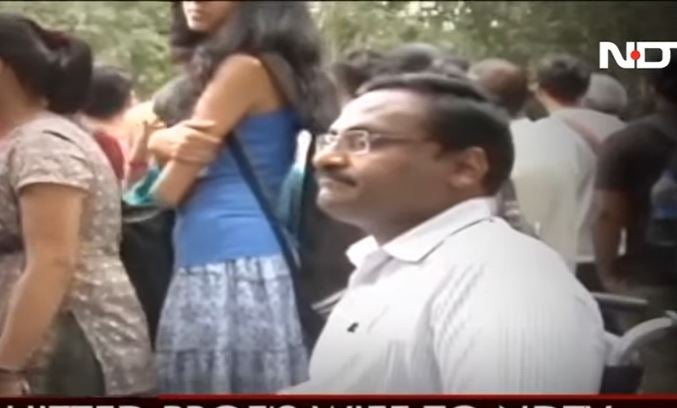UN expert calls on India to end ‘inhumane and senseless’ imprisonment of disabled professor
‘It bears all the hallmarks of a state seeking to silence a critical voice’

Your support helps us to tell the story
From reproductive rights to climate change to Big Tech, The Independent is on the ground when the story is developing. Whether it's investigating the financials of Elon Musk's pro-Trump PAC or producing our latest documentary, 'The A Word', which shines a light on the American women fighting for reproductive rights, we know how important it is to parse out the facts from the messaging.
At such a critical moment in US history, we need reporters on the ground. Your donation allows us to keep sending journalists to speak to both sides of the story.
The Independent is trusted by Americans across the entire political spectrum. And unlike many other quality news outlets, we choose not to lock Americans out of our reporting and analysis with paywalls. We believe quality journalism should be available to everyone, paid for by those who can afford it.
Your support makes all the difference.A United Nations human rights expert has raised alarms over the "inhuman and senseless" imprisonment of an Indian rights activist with disabilities and demanded his release citing deteriorating health conditions.
Gokarakonda Naga 'GN' Saibaba, a former Delhi University professor with 90 per cent disability, was arrested in 2014 for his alleged links to the banned Communist Party of India (Maoists) – an organisation of far-left rebels.
Three years later, the wheelchair user was sentenced to life imprisonment for multiple offences under the draconian Unlawful Activities Prevention Act.
"His continued detention is shameful," Mary Lawlor, the UN Special Rapporteur on the situation of human rights defenders, said. She described Saibaba, 57, as a long-standing defender of the rights of minorities, including Dalits and Tribal people.
"It bears all the hallmarks of a State seeking to silence a critical voice," the UN expert added.
Apart from two short periods of bail, Saibaba has been held in the Nagpur Central Jail in India's western state of Maharashtra. He has been detained in a high security 8×10 feet cell with no windows and a wall made of iron bars, that exposes him to extreme weather temperatures, Ms Lawlor said.
According to his wife, Vasantha, the rights defender suffers from “several life-threatening ailments” such as hypertrophic cardiomyopathy, kidney stones, hypertension, partial paralysis, a cyst in his brain and pancreatic problems.
His family and lawyers have also accused the prison authorities of failing to hand over medicines, woolen caps, books and other necessary articles.
Saibaba was acquitted by the Bombay High Court in 2022 but a few hours later the Supreme Court of India overturned the decision, citing threats against the "interest of the society, sovereignty and integrity" of the country.
Again in April, the Bombay High Court discharged Saibaba in a Maoist links case, raising hopes for his release, but the order was set aside by the Supreme Court.
Ms Lawlor, who said was in touch with New Delhi regarding the case, stressed that countries have an obligation to "uphold the right to health of prisoners and detainees and ensure their dignity as human beings".
"Prison authorities must ensure that prisoners with disabilities are not discriminated against, including by ensuring accessibility and providing reasonable accommodation,” she added.
“As Mr Saibaba’s health has severely deteriorated in detention, he should be released."
In 2021, one of India's prominent Tribal activists died in hospital as an under trial, even as his bail applications on terror charges remained pending.
Father Stan Swamy, 84, was detained in 2020 over allegedly supporting far-right Maoist rebels.
The Jesuit priest sought bail after his health declined, but authorities denied his repeated requests.
Following his arrest, Swamy had filed a plea in court seeking a straw and a sipper cup because his hands shook due to Parkinson’s disease. The National Investigation Agency (NIA) denied seizing a straw and sipper from him after which the court had directed the jail authorities to provide them to Swamy.



Join our commenting forum
Join thought-provoking conversations, follow other Independent readers and see their replies
Comments